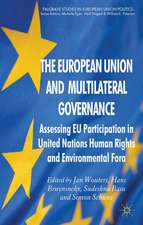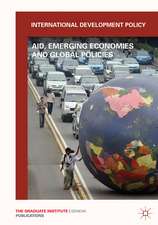Can Institutions Have Responsibilities?: Collective Moral Agency and International Relations: Global Issues
Autor Toni Erskineen Limba Engleză Paperback – 2 noi 2003
| Toate formatele și edițiile | Preț | Express |
|---|---|---|
| Paperback (1) | 383.71 lei 6-8 săpt. | |
| Palgrave Macmillan UK – 2 noi 2003 | 383.71 lei 6-8 săpt. | |
| Hardback (1) | 388.52 lei 6-8 săpt. | |
| Palgrave Macmillan UK – 11 noi 2003 | 388.52 lei 6-8 săpt. |
Din seria Global Issues
-
 Preț: 136.44 lei
Preț: 136.44 lei - 8%
 Preț: 158.20 lei
Preț: 158.20 lei - 9%
 Preț: 157.57 lei
Preț: 157.57 lei - 14%
 Preț: 143.78 lei
Preț: 143.78 lei - 14%
 Preț: 234.44 lei
Preț: 234.44 lei - 13%
 Preț: 235.44 lei
Preț: 235.44 lei - 15%
 Preț: 642.83 lei
Preț: 642.83 lei - 14%
 Preț: 234.17 lei
Preț: 234.17 lei - 14%
 Preț: 144.29 lei
Preț: 144.29 lei -
 Preț: 175.88 lei
Preț: 175.88 lei - 15%
 Preț: 647.92 lei
Preț: 647.92 lei - 15%
 Preț: 643.34 lei
Preț: 643.34 lei -
 Preț: 386.99 lei
Preț: 386.99 lei - 14%
 Preț: 111.38 lei
Preț: 111.38 lei - 15%
 Preț: 642.51 lei
Preț: 642.51 lei - 14%
 Preț: 145.90 lei
Preț: 145.90 lei -
 Preț: 392.21 lei
Preț: 392.21 lei - 15%
 Preț: 643.84 lei
Preț: 643.84 lei -
 Preț: 314.92 lei
Preț: 314.92 lei - 13%
 Preț: 235.18 lei
Preț: 235.18 lei - 15%
 Preț: 155.89 lei
Preț: 155.89 lei - 15%
 Preț: 640.71 lei
Preț: 640.71 lei -
 Preț: 355.62 lei
Preț: 355.62 lei - 15%
 Preț: 643.34 lei
Preț: 643.34 lei - 18%
 Preț: 782.44 lei
Preț: 782.44 lei -
 Preț: 354.77 lei
Preț: 354.77 lei - 9%
 Preț: 157.04 lei
Preț: 157.04 lei - 18%
 Preț: 1015.82 lei
Preț: 1015.82 lei - 15%
 Preț: 639.41 lei
Preț: 639.41 lei - 14%
 Preț: 124.37 lei
Preț: 124.37 lei - 13%
 Preț: 235.63 lei
Preț: 235.63 lei -
 Preț: 391.22 lei
Preț: 391.22 lei - 15%
 Preț: 644.18 lei
Preț: 644.18 lei - 13%
 Preț: 234.53 lei
Preț: 234.53 lei - 14%
 Preț: 158.64 lei
Preț: 158.64 lei - 15%
 Preț: 641.85 lei
Preț: 641.85 lei -
 Preț: 391.22 lei
Preț: 391.22 lei -
 Preț: 392.75 lei
Preț: 392.75 lei - 14%
 Preț: 144.39 lei
Preț: 144.39 lei - 15%
 Preț: 644.49 lei
Preț: 644.49 lei -
 Preț: 383.93 lei
Preț: 383.93 lei -
 Preț: 358.16 lei
Preț: 358.16 lei - 15%
 Preț: 142.89 lei
Preț: 142.89 lei - 15%
 Preț: 639.25 lei
Preț: 639.25 lei
Preț: 383.71 lei
Nou
Puncte Express: 576
Preț estimativ în valută:
73.43€ • 79.74$ • 61.68£
73.43€ • 79.74$ • 61.68£
Carte tipărită la comandă
Livrare economică 22 aprilie-06 mai
Preluare comenzi: 021 569.72.76
Specificații
ISBN-13: 9781403917201
ISBN-10: 1403917205
Pagini: 241
Ilustrații: XII, 241 p.
Dimensiuni: 140 x 216 x 13 mm
Greutate: 0.31 kg
Ediția:2003
Editura: Palgrave Macmillan UK
Colecția Palgrave Macmillan
Seria Global Issues
Locul publicării:London, United Kingdom
ISBN-10: 1403917205
Pagini: 241
Ilustrații: XII, 241 p.
Dimensiuni: 140 x 216 x 13 mm
Greutate: 0.31 kg
Ediția:2003
Editura: Palgrave Macmillan UK
Colecția Palgrave Macmillan
Seria Global Issues
Locul publicării:London, United Kingdom
Cuprins
Introduction: Making Sense of 'Responsibility' in International Relations: Key Questions and Concepts; T.Erskine PART I: IDENTIFYING MORAL AGENTS: STATES, GOVERNMENTS AND 'INTERNATIONAL SOCIETY' Assigning Responsibilities to Institutional Moral Agents: The Case of States and Quasi-states; T. Erskine Moral Responsibility and the Problem of Representing the State; D.Runciman Moral Agency and International Society: Reflections on Norms, the UN, the Gulf War, and the Kosovo Campaign; C.Brown PART II: OBSTACLES AND ALTERNATIVE QUESTIONS Collective Moral Agency and the Political Process; F.V.Harbour Constitutive Theory and Moral Accountability: Individuals, Institutions, and Dispersed Practices; M.Frost When Agents Cannot Act: International Institutions as 'Moral Patients'; C.Navari PART III: HARD CASES: ASSIGNING DUTIES NATO and the Individual Soldier as Moral Agents with Reciprocal Duties: Imbalance in the Kosovo Campaign; P.Cornish & F.V.Harbour The Anti-Sweatshop Movement: Constructing Corporate Moral Agency in the Global Apparel Industry; R.DeWinter PART IV: HARD CASES: APPORTIONING BLAME The Responsibility of Collective External Bystanders in Cases of Genocide: The French in Rwanda; D.Kroslak The United Nations and the Fall of Srebrenica: Meaningful Responsibility and International Society; A.F.Lang, Jr. PART V: CONCLUSIONS On 'Good Global Governance', Institutional Design and the Practices of Moral Agency; N.Rengger Global Justice: Aims, Arrangements and Responsibilities; C.Barry Selected Bibliography Index
Notă biografică
CHRISTIAN BARRY Director, Program on Justice and the World Economy, Carnegie Council on Ethics and International AffairsCHRIS BROWN Professor of International Relations, London School of Economics, UKPAUL CORNISH Director, Centre for Dence Studies, Kings College, University of London, UKREBECCA DEWINTER School of International Service, American University, USAMERVYN FROST Professor of International Relations, University of Kent at Canterbury, UKFRANCES V. HARBOUR Associate Professor of Government and International Affairs, George Mason University, USADANIELA KROSLAK University of Wales, Aberystwyth, UKANTHONY F. LANG Jr. Program Officer, Carnegie Council on Ethics and International AffairsCORNELIA NAVARI Senior Lecturer, Department of Political Science and International Studies, University of Birmingham, UKNICHOLAS RENGGER Professor of Political Theory and International Relations, St Andrews University, UKDAVID RUNCIMAN Lecturer in Political Theory, University of Cambridge, UK


















